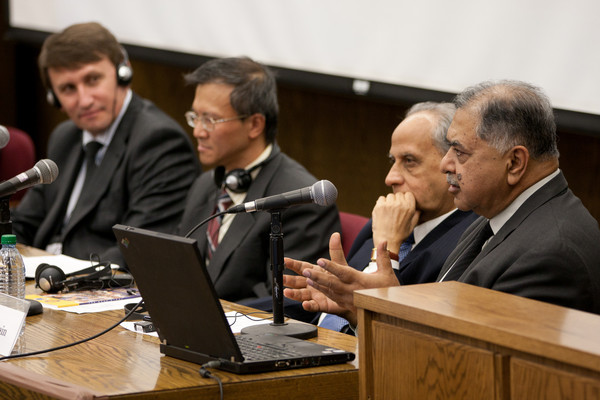





L-R: Oleksandr Zaeits (Ukraine), Qianfan Zhang (China), Tahir Mahmood (India), Kamal Hossain (Bangladesh)
Newsletter of 10 November 2010
"We urgently need to build bridges with the Islamic world. I can think of few projects that are more crucial at the present time." – Author Karen Armstrong, quoted by Dr. Kamal Hossain
At the close of the Seventeenth Annual International Law and Religion Symposium at Brigham Young University on Tuesday afternoon, 5 October 2010, ICLRS Director W. Cole Durham invited several of the conference's distinguished participants – from Columbia, Canada, Ukraine, China, Bangladesh, and India – to join him on the dais in the Moot Court Room of the J. Reuben Clark Law School for concluding remarks. Those of us in attendance or viewing the live Internet stream were thus privileged to hear once again from Father Vicente Prieto, Professor Iain T. Benson, Professor Oleksandr Zaiets, Professor Qianfan Zhang, Dr. Kamal Hossain, and Dr. Tahir Mahmood, who joined Professor Durham in evaluating the success of this outstanding conference, and in articulating the hopes for the future that arose from the presentations and the dialog among participants.
As we departed the concluding event the next day, I discussed the Symposium with Erasmus Malherbe, law professor at the University of Johannesburg. We agreed upon the unusual warmth and cohesiveness of the event. I mentioned that we might expect people who share a common interest in religious freedom to be similar in other ways. It's more than that, said Professor Malherbe. "It's a common spirituality."
Certainly there is something significant in finding common ground among participants as diverse as an Israeli-American professor from Harvard; Islamic leaders from Jordan, India, Indonesia, and the Philippines; Catholic priests from Colombia and Nigeria and a Unification Church pastor from Guyana; judges from Brazil, Ghana, the United States, and Senegal; government officials from Latin America, Pakistan, Mongolia, and Viet Nam; scholars from Africa, Australia, Canada, China, Europe, Nepal, Russia, Ukraine; and the gentleman who helped write the Constitution of Bangladesh. All coming together, as described on that concluding panel by Professor Iain T. Benson, a Scot citizen of Canada residing in France and teaching in South Africa, "in furthering friendship."
"This has been an extraordinary experience," said another member of the concluding panel, Dr. Kamal Hossain, distinguished former government minister from Bangladesh, who was one of the principal authors of his nation’s constitution and who offered what for many of us surely will be the metaphor through which the 2010 Symposium will be remembered: "It has been a unique forum given its diversity and its format. But it has had all the warmth of a family reunion… What is quite extraordinary is that from Bangladesh to [South America], and including the diversity of all the nations represented here, you really feel you could connect." Even though you have never been here before, said Dr. Hossain, you feel you have always been part of the family. And even though you will not be here next year, when the family gathers again, you know they will still be discussing the same issues.
In his own concluding remarks, Professor Durham expressed his hope that the Symposium had planted seeds of collaboration and mutual understanding, and urged all in attendance to take what they had learned during the conference and apply it in their respective nations. With the addition of this year's delegates, the Symposium "family" now numbers some 850 members from 113 nations. We here at the Center look forward to continued exchange with year's delegates, as with those we have met in the past, as we work together for ever greater understanding, freedom, and peace in all the world.
Donlu Thayer, Senior Editor
International Center for Law and Religion Studies
Photo L-R: Delegates Oleksandr Zaeits (Ukraine), Qianfan Zhang (China), Tahir Mahmood (India), Kamal Hossain (Bangladesh)
Photos in this newsletter are by Matt Imbler unless otherwise noted.
